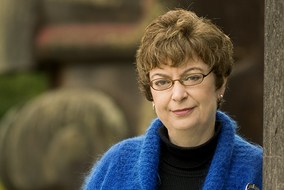
Prof. Judith Soon plans to establish a patient-centred pharmacy clinic on Haida Gwaii - photo by Martin Dee UBC Reports | Vol. 54 | No. 6 | Jun. 5, 2008
A Plan to Expand UBC’s Pharmaceutical Services to HAIDA GWAII
By Catherine Loiacono
Haida Gwaii, an archipelago of more than 150 islands off B.C.’s northern coast, is home to 5,400 residents, but only one pharmacist. Assistant Professor of Pharmaceutical Sciences Judith Soon and fellow researchers in UBC’s Collaboration for Outcomes Research and Evaluation (CORE) group have a plan to change this by establishing a patient-centred pharmacy clinic.
The Government of British Columbia is now considering the CORE proposal, which would see five to 10 UBC pharmacy students per year, giving that sole pharmacist -- Daryl Regier who resides in Queen Charlotte City -- some needed assistance. The average pharmacist to patient ratio in B.C. is one per 1,000.
At the same time, additional hands-on health care services would be designed to reflect the cultural traditions and sensitivities of the Haida people, who have called these islands home for more than 12,000 years. Known for its scenic beauty, Haida Gwaii or Queen Charlotte Islands, is rich in Haida tradition and culture.
The two pharmacies which operate on Haida Gwaii are located on Graham Island -- in Queen Charlotte City and in Masset. Both pharmacies provide courier services to deliver medications to residents of many of the villages located outside these communities. Regier provides services to the local hospital and residents in the surrounding southern communities. Masset residents and the surrounding northern communities receive medications through the Northern Health Authority. The patient-centred pharmacy practice clinic would be established in the Haida community of Skidegate, which is located close to Queen Charlotte City.
“The current system works but there is a real need to connect with the community and provide additional hands-on health care services to these residents,” says Soon. “There are high rates of chronic diseases and a patient-centred pharmacy clinic can help improve quality of life by optimizing the safe and effective use of medications.”
Patient-centered care directly incorporates the perspectives of patients and families into the planning, delivery and evaluation of the provision of health care.
“A patient-centred pharmacy clinic would incorporate beliefs and cultural backgrounds into the planning of the delivery of care,” says Soon. “In addition, there is a focus on collaboration between patients, families and community health care practitioners in the development of programs and professional education.”
The proposed clinic’s primary goals are to improve health care outcomes and to increase the number of health care professionals who practice in rural settings. The patient-centred pharmacy clinic would be a collaboration between the UBC Faculty of Pharmaceutical Sciences and Regier’s Queen Charlotte Islands Pharmacy. A community consultation process will determine which additional services would best meet the needs of the community.
In September 2006, the Government of B.C. launched the Conversation on Health, a public discussion to engage British Columbians on health related issues and the B.C. public health care system.
“Based on some of the recommendations from the 2006 Conversation on Health, we were asked by the Ministry of Health to submit a proposal that could assist in decreasing the gaps in Aboriginal health -- particularly on Haida Gwaii,” says Soon. “First Nations communities are concerned with overall poor health, higher rates of diabetes, arthritis, HIV/AIDS and tuberculosis as well as lower life expectancy.”
According to Soon, programs delivered by the patient-centred pharmacy clinic could include counselling following discharge from hospital, new medication follow-up and self-management counselling for chronic diseases such as diabetes and osteoarthritis.
“Some patients experience adverse drug reactions,” says Soon. “We have noticed that if patients do not respond well to the prescribed medication and they do not have immediate access to a health care professional, often times, they will abruptly stop taking the medication. This can lead to potentially preventable complications related to their illnesses.”
Soon’s vision includes emphasizing the role of the pharmacist in monitoring medication management, and providing medication counselling.
“We want to be able to integrate traditional methods of healing with pharmaceutical medicines. By implementing culturally sensitive strategies, we believe we can improve health related outcomes,” says Soon.
“Patients will be able to discuss drug-related therapeutic concerns, more specifically how the medications are working for them” says Soon. “If we know how patients are reacting to their medications, we can work with them, family members and other health care professionals to optimize their health outcomes.”
Soon believes a patient-centred pharmacy clinic would provide a valuable outreach opportunity to promote learning in a rural and northern setting, and potentially encourage more pharmacy undergraduate students and community pharmacy residents to practice in a rural setting in the future.
|
